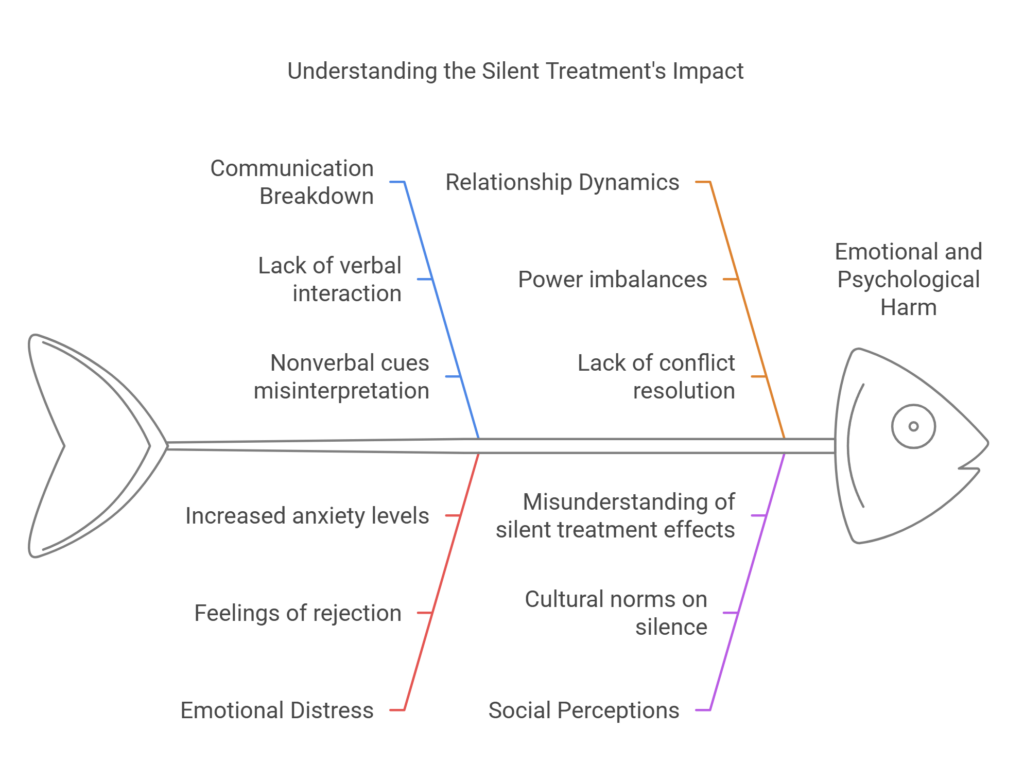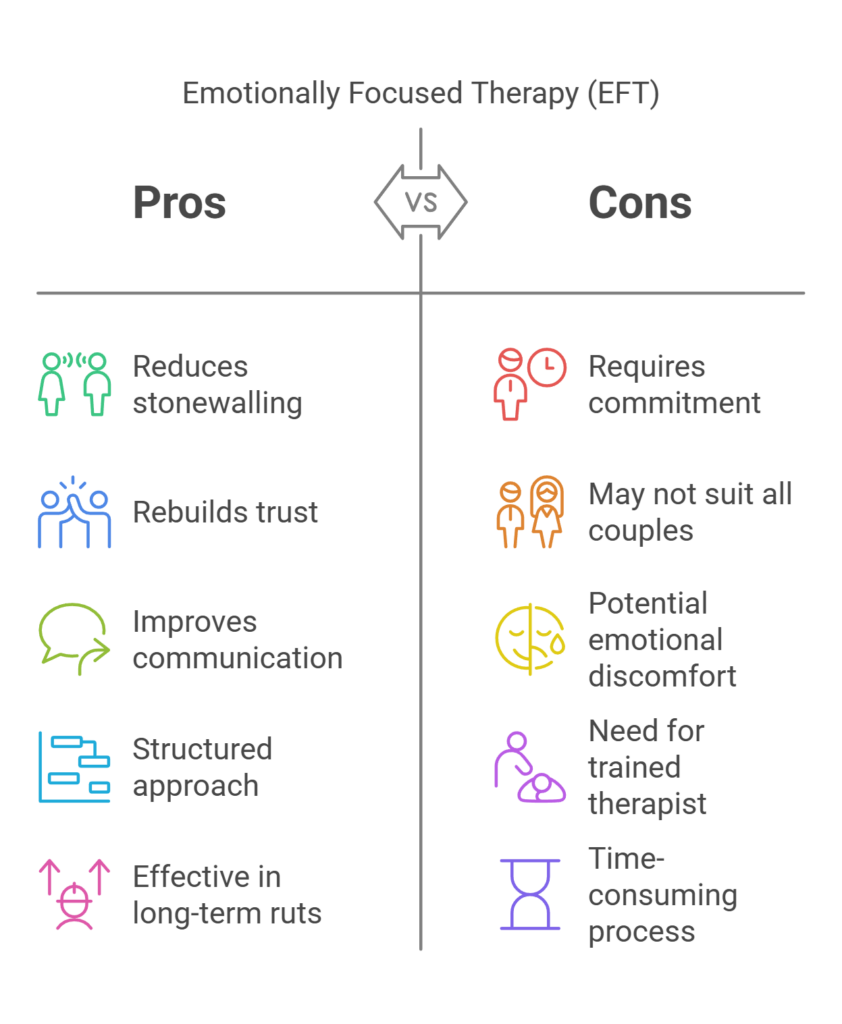Key points
• Stonewalling happens when someone ignores the other person, usually by behaving quietly or responding in a less than colourful way with a simple “yes” or “no”.
• It stops being able to work on problems, which makes the problem worse and makes you upset.
• When one shuts down a discussion, it will create distance between partners or between the partners and their child.
Contents
Stonewalling has a negative impact on relationships. It’s like when a person stops and refuses to talk to their partner. Dr. Sue Johnson talks a lot about this in her book Hold Me Tight. She says it’s one of the most important things that ruin relationships.
When you are not just quiet with your partner but actually putting up a wall, it is not a good sign. But what is the reason behind it? People may stonewall because they feel overwhelmed or frightened. At other times, they may not even realise they are.
When partners feel overpowered, they emotionally shutdown or stonewall, as Johnson says. Based on clinical observations, Johnson connects the stonewalling to avoidance driven by fear; connection suffers. Her Emotionally Focused Therapy (EFT) framework helps couples turn withdrawal into dialogue and teach couples how stonewalling starts in the first place.
What Is Stonewalling?
What does stonewalling mean? So, what is stonewalling? It is when one partner completly checks out of a conversation with the other, who isn’t done talking.
- It could look like any of the following:
- They could give you the silent treatment
- They might busy themselves to avoid the conversation
Sometimes they ‘leave’ the conversation by getting up and walking out of the room. Basically, they’re building a freakin’ stone wall between the two of you. Stonewalling? It’s more than just keeping your mouth shut. It’s about closing off emotionally too.
You may notice them turning away from you, crossing their arms, looking away, avoiding eye contact, and looking at their phone instead. It is very annoying for the other person.
Stonewalling can affect a person psychologically and emotionally
Being stonewalled can make you feel neglected and worthless. It can cause you to doubt yourself It can make you feel alienated and rejected. It can damage your self-esteem over time. In the long term, stonewalling is bad for business too.
The stonewaller may begin to feel regret or shame about their behavior. They may feel trapped and not know how to end the cycle. Everybody loses in stonewalling. That’s where Dr. Johnson believes it’s vital to recognize stonewalling and learn how to deal with it. If you don’t, it can hurt your relationship in the long run.

According to Williams, being given the silent treatment makes us feel invisible. It makes you feel like a social reject, or what Williams calls “relational erasure”. Those on the receiving end feel their self-esteem has got worse and they experience loneliness. This is even if the person giving the silent treatment doesn’t intend any harm. The study highlights how silence, even if unintentional, can be harmful in relationships.
Psychological Effects of Stonewalling
Study Title: “The Silent Treatment: Perceptions of Its Behaviors and Associated Feelings”
Researcher: Dr. Kipling D. Williams
Research Organization: Purdue University
Date of Research: 2001
Topic of Research: Emotional and psychological harm caused by silent treatment/stonewalling.
Causes of Stonewalling.
Stonewalling’s a tricky beast. It’s when someone shuts down during a conversation, like putting up an emotional wall. But what makes this happen? There are many reasons for such an action. It occurs because people feel overwhelmed.
They become unable to process all the feelings so they just…… check out. And other times? It’s a learned behavior. Perhaps they saw their parents do it, or they realized it was a great way to avoid conflict. But on the flip side, it seems to happen just when someone’s feeling pretty defensive or even just plain hopeless.
Emotional Withdrawal and Avoidance.
Let us discuss emotional withdrawal and avoidance. It’s like you are playing a game of hide and seek, but with feelings. Emotional withdrawal is characteristic of stonewallers. They may start to avoid eye contact with you, turn away, or even leave.
They’re basically saying “I’m out” without actually saying it. And avoidance? They do not want to get in a situation where an argument can occur. They just want to avoid conflict and not be involved in it. However, it does not resolve anything, though. It causes the issues to be covered up.
Avoiding disagreement due to fear and reluctance to be vulnerable.
Some people are just afraid of fights. Some of them are worried that things will spiral out of control or that they’ll say something that can’t be taken back.
They rather choose to stay quiet. And vulnerability? That’s scary too. Expressing feelings can sometimes hurt you. Some people find it uncomfortable to open up to others as though their heart is on their sleeves.
But the irony is that avoidance of conflict and vulnerability by the stonewaller does harm to the relationship. They miss the opportunity to bond and become closer with their partner.
Stonewalling hurts relationships.
When stonewalling, it’s easy to miss it. When partners stonewall, they are fighting in an unproductive manner. When one partner cuts off communication, it creates a problematic situation that is hard to remedy and restore.
Breakdown of Communication.
This is to say communication is entirely damaged by stonewalling. When someone does the stonewalling thing, it means that they’re saying, “I’m done paying attention to you.” It makes it very difficult to solve any problem or even talk about daily things.
Before long, a couple will not talk about anything other than boring stuff like groceries or who is collecting the kids. The real, important conversations? Compatible couples don’t exist anymore.
Increased Emotional Distance.
But wait, there’s more. When you refuse to talk, the conversation is over. Stonewalling kills the conversation. When one partner continues shutting down, the other partner starts feeling neglected and unimportant.
It’s like shouting across a canyon. You can see your partner’s lips moving, but you can’t figure out what they are trying to say. When couples feel emotionally distant over time, they might develop resentment, loneliness, and disconnection.
Partners may begin to lead separate lives while staying under the same roof, and this can make for a very unhappy relationship.
Identifying Stonewalling in Relationships.
Not reacting with the partner is bad in a relationship. Someone goes quiet and stops talking to you. In her book Hold Me Tight, Dr. Sue Johnson goes into great detail about this. And it doesn’t just mean shutting up. It’s about building barriers and cutting off your feelings. But how do you recognize it? Well, it’s pretty easy Once you know what to look for!
Recognizing Patterns and Behaviors
Emotional Signals and Responses.
Feelings are a major part of stonewalling. The person doing it? They’re often feeling frazzled or scared. It’s like their brains stop working, and they can’t get through. What about the person on the other end? People can feel excluded, worthless, or even unseen.
Everyone is feeling the strain. But Recognizing these emotional signals is crucial to breaking the stonewalling cycle. Dr. Johnson’s work helps couples become aware of these patterns and connect better.
Strategies to Overcome Stonewalling.

Johnson tested her therapy model and noted a 60% reduction in couples’ stonewalling within two years. Johnson’s method taught partners to express vulnerability versus contempt; e.g. by saying “I’m scared” instead of “I’m done”. In doing so, 32 distressed couples rebuilt trust through this method. Overall, findings show that emotional engagement is a very useful intervention to tear down walls.
Study Title: “Emotionally Focused Therapy for Couples: Two-Year Follow-Up”
Researcher: Dr. Sue Johnson
Research Organization: University of Ottawa
Date of Research: 2015
Topic of Research: Efficacy of Emotionally Focused Therapy (EFT) for resolving communication breakdowns.
Subject Count: 32 couples in longitudinal therapy trials.
Stonewalling can be tough, but it can be overcome. It all begins with understanding what is actually going on underneath. Dr. Sue Johnson has some great material on this topic in her book “Hold Me Tight.”
Building Emotional Awareness.
You need to connect with your feelings first. The more you know what’s happening on the inside, the less you’ll shut down. Here are some pointers for you to consider.
- The body has a lot to tell.
- Journaling your feelings is helpful.
- Don’t be rigid while doing this.
- Mindfulness is not just for yogis. Speak to a therapist.
- Don’t be afraid to express your feelings.
- Even the bad stuff.
- It’s Okay To Feel Things
Encouraging Open Communication.
Communication is key. However, it is not only talking which matters, but listening is also necessary. Here are some ideas to keep the talk flowing.
It’s essential to get familiar with conversation starters & questions that can help you keep the conversation going.
The more practice, the easier it becomes. Before long, your walls will start to break open and crumble. Don’t try to win the argument; winning the understanding is the goal.
Real-life examples
Illustrative Scenarios of Stonewalling.
More examples of stonewalling include the silent treatment (where one partner stops talking), changing the subject (where one partner avoids a potential topic), physical withdrawal (where a partner literally leaves the room or the house), and busy-ness (where one partner suddenly gets a lot more focused on work or hobbies). All these results in one outcome – blocking of communication and connection.
Successful Interventions and Resolutions.
And here’s the good thing – there are ways to resolve this! Dr. Johnson’s book offers great strategies. Notice when stonewalling is occurring to stop it from the start instead of just letting it grow and fester.
Taking a short pause: Sometimes, removing oneself from the situation for a little while will cool things down. Learning how to express what you need, like saying “I need a hug” instead of shutting down, can change everything.
It can really help to put yourself in your partner’s shoes. These interventions have helped tons of couples break through the stonewalling and start talking again. It might be hard at times, but it’s definitely worth it for a much happier relationship.
Frequently Asked Questions (FAQ)
How does stonewalling differ from other conflict management styles?
Stonewalling is a way people handle conflicts by shutting down. It’s different from other styles because it involves completely withdrawing from the interaction. While some folks might argue or try to fix things, stonewallers just… disappear. They stop talking, avoid eye contact, and basically check out. It’s like they build a wall between themselves and their partner. This behavior can really mess up the fabric of relationships, causing more problems than it solves.
What role does fear play in stonewalling behavior?
Fear’s a big player in stonewalling. People often stonewall ’cause they’re scared of getting hurt or making things worse. It’s like a self-protection thing. They might be afraid of their own emotions or their partner’s reaction. This fear can make them shut down and withdraw. It’s a pattern that can really mess up the connection between partners. And it’s not just in romantic relationships – it can happen with friends, family members, and even coworkers.
How does John Gottman's research contribute to our understanding of stonewalling?
John Gottman, he’s this big name in relationship research. He talks about stonewalling as one of the ‘Four Horsemen’ that can wreck relationships. His work shows how stonewalling messes up communication and emotional connections. Gottman’s studies give us insights into why people stonewall and how it impacts couples. He’s even come up with ways to help folks overcome this behavior. His research is pretty key in understanding the whole stonewalling thing.
Can stonewalling be a form of emotional abuse?
Yeah, stonewalling can totally be a form of emotional abuse. It’s not always intentional, but it can really mess with someone’s head. When a person constantly stonewalls, it leaves their partner feeling ignored and unimportant. This can chip away at their self-esteem and sense of reality. It’s like a slow-burning kind of abuse that can do a lot of damage over time. In some cases, it’s used as a way to control or manipulate the other person, which is definitely abusive behavior.
How does stonewalling impact the emotional stability of both partners in a relationship?
Stonewalling can really rock the boat when it comes to emotional stability. For the person doing the stonewalling, it might feel like a way to keep their emotions in check, but it actually builds up stress and anxiety. And for the other person? It’s like talking to a brick wall. They might feel rejected, confused, and super frustrated. Over time, this can lead to a whole bunch of negative feelings and even self-loathing. It’s like this emotional rollercoaster that messes with both people’s sense of security in the relationship.
What are some effective strategies for overcoming stonewalling in relationships?
Okay, so beating stonewalling takes some work, but it’s doable. First off, both partners gotta recognize the problem. Then, it’s all about building better communication skills. This might mean learning to express feelings without getting defensive. For the stonewaller, practicing something called ‘physiological self-soothing’ can help. It’s about calming yourself down when things get intense. Couples might also benefit from setting up some ground rules for arguments. And sometimes, getting help from a pro, like a therapist, can make a big difference in breaking the stonewalling pattern.
How does stonewalling differ from ghosting in modern relationships?
Stonewalling and ghosting might seem similar, but they’re not quite the same thing. Stonewalling usually happens in ongoing relationships, where one person shuts down during conflicts. Ghosting, on the other hand, is more about completely cutting off contact, often in newer relationships or with online connections. While both can leave the other person feeling confused and hurt, stonewalling is more about avoiding conflict within a relationship, and ghosting is about ending all communication. Both can really mess with someone’s head, though.
How does stonewalling relate to personality types, such as INFP or ISTJ?
Personality types can play a role in stonewalling behavior. Take INFPs, for example. They’re often sensitive and might stonewall to avoid confrontation. ISTJs, on the other hand, might use stonewalling as a logical way to deal with emotional situations they find uncomfortable. But it’s not just about personality types. Things like past experiences, anxiety, and even conditions like autism can influence how someone handles conflict. Understanding these connections can help people recognize their own patterns and work on better ways to communicate.
How can technology and modern communication methods influence stonewalling behaviors?
Technology’s definitely changed the game when it comes to stonewalling. These days, it’s super easy to ignore texts, leave messages on ‘read’, or block someone on social media. This can make stonewalling even more tempting for some folks. On the flip side, tech can also make it harder to truly stonewall, ’cause there are so many ways to reach out. It’s like this double-edged sword in relationships. Understanding how tech impacts our communication patterns is pretty important in today’s world, especially in the innovation economy where digital interactions are so common.
What role do cultural differences play in stonewalling behaviors and perceptions?
Cultural differences can have a big impact on how people view and deal with stonewalling. In some cultures, being direct about feelings isn’t the norm, so what looks like stonewalling might just be a different communication style. Other cultures might see stonewalling as a respectful way to avoid conflict. It’s important to remember that what’s seen as stonewalling in one culture might be totally normal in another. This is especially true in our global world, where relationships often cross cultural lines. Understanding these differences can help couples navigate conflicts better and avoid jumping to conclusions about their partner’s behavior.

I am an award-winning author who has deep insights into the world of dating & relationships. I have won several awards including Andromeda Magazine – Fantasy Short Fiction Story award amongst several other awards and writing achievements.